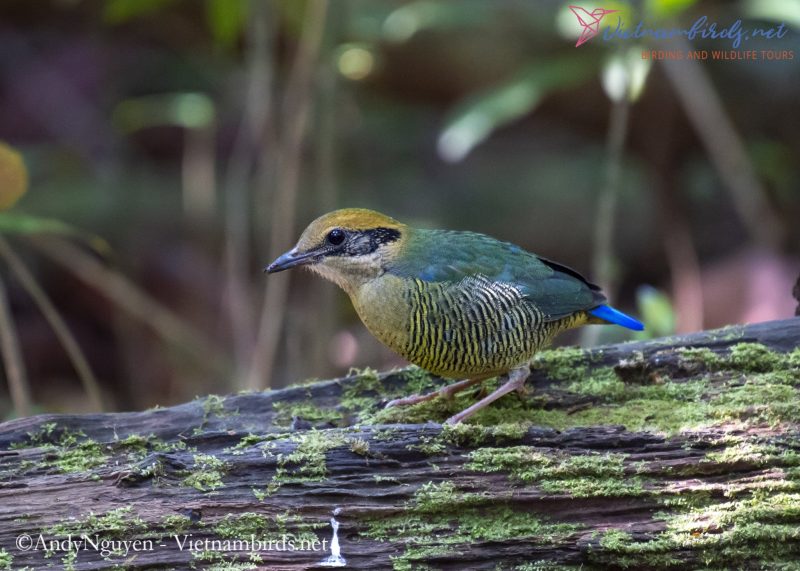To answer this question, simply listing places is too simple and does not provide a complete overview for birders who want to learn about wildlife and birdwatching in Vietnam.
First, let’s learn about the natural conditions and wildlife habitats in Vietnam. This is a tropical monsoon country, stretching from north to south through many climates, many different altitudes creating unique characteristics for each region. Since then, each region will have its own species of birds, with specific and endemic species.
Lowland evergreen and semi-evergreen forest
This is a high diversity of broadleaf trees and rich, diverse bird communities, lowland evergreen forest is the natural forest type over much of lowland Vietnam, below 800m AMSL. Semi-evergreen forest, or mixed deciduous, the forest is very similar to lowland evergreen forest but more addition of deciduous trees such as dipterocarps.
The places with this typical forest type can be mentioned as Cat Tien National Park, Dong Nai nature reserve, Bu Gia Map National Park, Cuc Phuong National Park, Phong Nha Ke Bang National Park…
Typical bird species found in Vietnam’s lowland evergreen and semi-evergreen forests include trogons, hornbills, pittas, pheasants, broadbill, cuckoos, owls, nightjars, bulbuls, babblers, sunbirds …



Mountain evergreen forest
Above 800m AMSL, mountain evergreen forest takes over from lowland evergreen with oaks, pine trees, chestnuts, beeches, laurels… Two distinct types of mountain evergreen forest in Vietnam can be recognized, first is from 800m to 1600m AMSL is lower montane evergreen forest.
Some places like Di Linh Plateau, Da lat city, Bach Ma National park, and Mang Den town are these types of lower evergreen forest. The places which high diversity of bird species including tits, babblers, warblers, nuthatches, thrushes, laughingthrushs.
The second type of forest, with an elevation greater than 1600m above sea level, is a higher evergreen forest. In this range the bird population will not be as diverse as the first type, however, we will encounter more endemic bird species here. Bidoup Núi Ba National Park, Ngoc Linh Natural reserve are listed.
We have targets for endemic bird species here such as Collared Laughingthrush, Chestnut-eared Laughingthrush, Golden-winged laughingthrush….




Deciduous forest
This type is dry areas of west-central highland Vietnam, deciduous forest includes dipterocarp, teak tree, Tung tree (Tetrameles )… that grows in drier areas on poor soil. As there is no mid storey level.
It is not rich birds in here, but that is a good place to encountering Woodpeckers, Owls, Falcons, or parakeets.
Yok Don National park is the place we can visit to do birdwatching for this type of forest.



Limestone forest
This forest type is an evergreen that grows areas on limestone. It is found in parts of the North East and Northcentral regions of Vietnam. Phong Nha Ke Bang National Park, Ba Be National Park are places where you can better understand this type of forest.
This is an important habitat for several limestone specialists such as Limestone leaf-warbler, Sooty Babbler, White-eared Night-heron,…


Freshwater Wetland
Include rivers with riparian grassland, lakes, and marshes, Tram Chim National park in the Mekong delta, or Van Long Nature Reserve in Red-river delta is this type of habitat.
We can meet waterbirds such as crakes, rails, storks, ibises, herons, egrets, cormorants, wintering ducks as well as migratory reed warblers on your bird watching trips.



Mangrove forest and Coastal wetland
We can visit Can Gio mangrove forest, Go Cong beach, only 1.5 hours car moving from Hochiminh city. Or Xuan Thuy National Park on the North to discover mangrove habitat in Vietnam.
Not rich in bird species in this habitat, but there are goals that you cannot ignore like Mangrove Whistler, Mangrove Blue-flycatcher. Furthermore, coastal estuaries and mudflats, and salt flats are the feedings and sheltering areas of migratory birds. Spoon-billed Sandpiper, Nordmann’s Greenshank, Asian Dowitcher, Great Knot, Godwits, Stints … are the birds which we can meet on your birdwatching trip in Vietnam.



Offshore Islands
Some rocky islands and large Islands in Southern Vietnam and Thailand’s Bay comprise Con Son Island, Phu Quoc Island, Nam Du Island are the type of habitats.
There are important breeding areas for seabirds or pelagic birds like Brown Noddy, Great-crested Tern…, In the forest in those Islands, we can meet some kind of Fish-eagles, Kites, Owls as well as Pied Imperial Pigeon, Nicobar Pigeon.


Himalaya subalpine Forest
In Hoang Lien National Park and some northwestern provinces of Vietnam, is the last stop of the majestic Himalayas, with many mountain ranges higher than 2500m and many peaks higher than 2800m, with high cliffs and deep abysses. These create a cold and inhospitable high altitude climate. The forest here is mostly dwarf bamboo and low grass bushes and some stunted trees.
However, at this high altitude, there are many beautiful birds of the Himalayas, they can be seasonal migratory species, or they can be native.
In which endemic bird species: Bar-winged Wren-babbler, Pale-throated Wren-babbler and especially White-throated Wren-babbler are the targets of every birder. Moreover, we can see fours species of laughingthrush, many tiny beautiful birds species such as Bar-throated Fulvetta, Manipur Fulvetta, White-browed Fulvetta, Whiskered Yuhina, Stripe-throated Yuhina, Red-tailed Minla, Blue-winged Minla, Golden Parrotbill, Spot-breasted Parrotbill, and some Woodpeckers…



More Bird Watching Holidays
Our Tours are intensive bird watching holidays suitable for the serious birder. Especially, our tours are led by expert local guides – Mr. Andy Nguyen. As a result, you can expect a higher-paced tour and to spend long hours in the field. For more tours please visit:
Contact in facebook, please click on my name
Call or Message by Whatsapp, viber with the same number: +84982928482
Email: [email protected]
Please contact with me to discuss more about your plan and targets to get best price
Alright, if you come to Vietnam and look for bird watching trips near me, you’ll know where to find?
